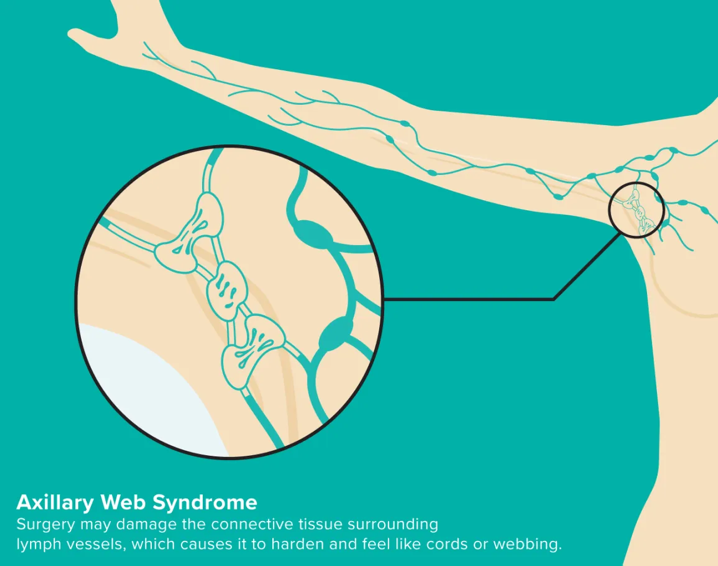
By: Nicole Rommer, PT, DPT, CLT-LANA, Barnabas Health Ambulatory Care Center
Axillary Web Syndrome (AWS), also known as cording, is still not fully understood; however, it most often develops after a sentinel lymph node biopsy or axillary lymph node dissection. Both of these procedures are often performed in individuals with breast cancer and involve a few (sentinel node biopsy) or many (axillary lymph node dissection) of the lymph nodes located in the underarm. Most likely the removal of these lymph nodes damages the connective tissue surrounding the lymph vessels. This results in scarring and hardening of the lymph vessels and possibly neighboring blood vessels and nerves, which results in these cords.
The cords often feel or look like a ropelike structure under the skin of the inner arm from the underarm and sometimes can extend down to the palm of the hand. Occasionally these cords can also spread down the chest wall. The cords create a sensation of pain and tightness/pulling most often when raising the arm to shoulder level and above the head. Cording can also develop as soon as a few days after surgery to as late as several months or a few years after surgery.
The good news is cording can be treated with physical therapy. It is advised to be treated by a physical therapist who specializes in breast cancer rehabilitation and/or by a certified lymphedema therapist. Patients who develop cording are at increased risk for future development of lymphedema (a specific type of swelling that occurs when too much lymphatic fluid builds up in the arm and/or hand). Physical therapy will consist of stretching, flexibility exercises, range of motion exercises, massage therapy, and lymphatic massage (manual lymphatic drainage). With the above treatment, most cases of Axillary Web Syndrome will clear up. Other risk factors for Axillary Web Syndrome is being of younger age, having a lower body mass index, having post-op complications, and undergoing radiation treatment. Physical therapy is the gateway to re-achieving a fully functioning upper body that will allow for normal daily task functioning.
Nicole Rommer, PT, DPT, CLT-LANA
Doctor of Physical Therapy
Certified Lymphedema Therapist
LANA Certified Specialist
Phone: 973-322-7529
Nicole is a physical therapist and lymphedema therapist at Barnabas Ambulator Care Center in Livingston, NJ. She primarily treats patients with lymphedema, breast cancer related impairments, and orthopedic conditions. Nicole completed her bachelors of science degree Magna Cum Laude at Boston University in 2011 and went on to complete her doctorate in physical therapy at Boston University’s Sargent College of Health and Rehabilitation Sciences in 2013. She became a Certified Lymphedema Therapist in 2014 and a Lymphedema Association of North America (LANA) Certified Specialist in 2020.
The Cooperman Barnabas Medical Center Rehabilitation centers are open and ready to help you achieve your goals. With four locations in West Orange, Millburn and Livingston, the experienced and compassionate staff at Cooperman Barnabas Rehabilitation offers adults and children the specialized care they need to resume an active life after surgery, injury or illness. They are committed to providing patients with the most advanced services in a safe, caring and soothing environment. For high-risk patients who are unable to visit in person, telehealth is an option. Patients do not need a prescription for physical therapy services.
For more information, or to schedule an appointment, call 973-322-7500.